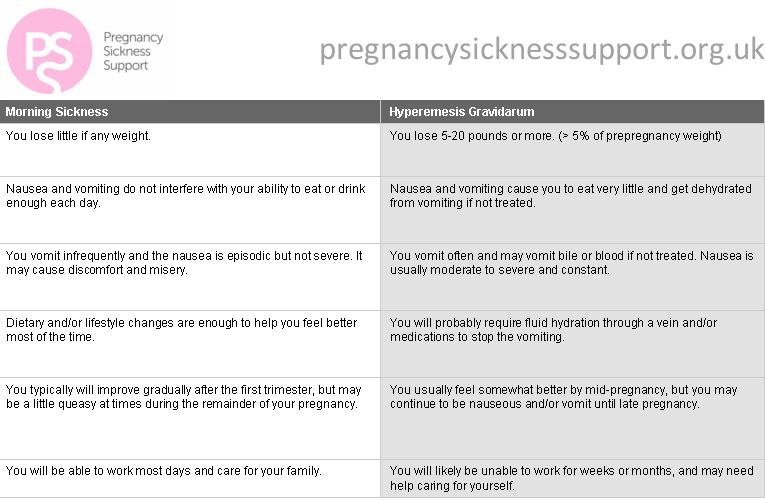What is Hyperemesis Gravidarum
Hyperemesis Gravidarum (HG) is severe and excessive nausea and vomiting in pregnancy that can affect approximately 1 in 100 pregnant women. But how can someone tell when it’s hyperemesis and when it’s regular Nausea and Vomiting in Pregnancy?
HG is diagnosed by doctors when:
~ Nausea and/or Vomiting doesn’t subside and is constant
~ Nausea and/or Vomiting is preventing adequate nutrition/fluid intake. Patients often become malnourished and/or dehydrated.
~ There is weight loss
~ Electrolyte imbalances
Here are some differences between NVP and HG, as illustrated by The Pregnancy Sickness Support Charity

How long does HG Last?
For a lot of HG patients, their sickness significantly improves between 14-20 weeks in pregnancy, sadly however there are some women who suffer the entire pregnancy.
But what causes HG in pregnancy?
Not a lot is known about why some women get more sick than others, but scientist believe there are a few possibilities that cause it. One of the theories is genetic component GDF15, another is to do with a rapid rise in the hCG hormone (human chorionic gonadotrophin). There are also theories that the thyroid can play a role in the the causes of hyperemesis gravidarum. Whatever the cause HG is seriously hellish
But forgetting the label. Any sickness in pregnancy is miserable and can really affect the mental health of the sufferer, especially if it is ongoing. Its important that whether you have HG or NVP that you reach out for support. You don’t have to suffer in silence there are so many things that you can try to help. Medications can help as well as other things that your health provider can discuss with you, but also talking support to deal with the low mood and negative feelings that constant nausea and vomiting can bring. A very good source of help for me was from the Pregnancy Sickness Support Charity who organised a peer worker for me to talk to, and there was also a very good forum where I could ask questions and talk to people in a similar situation.
Credit:
www.pregnancysicknesssupport.org.uk
www.rcog.org.uk
